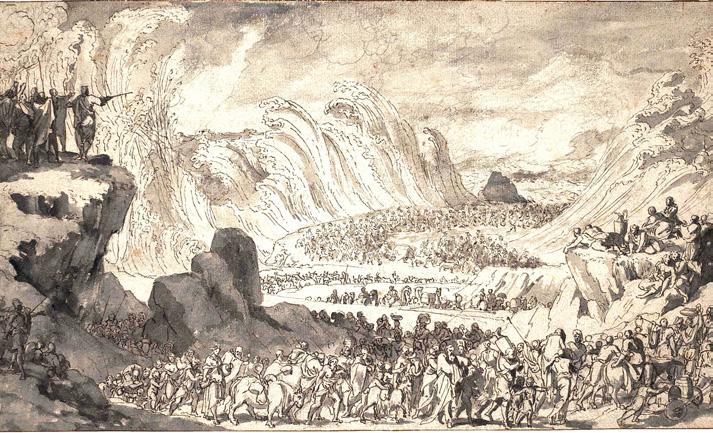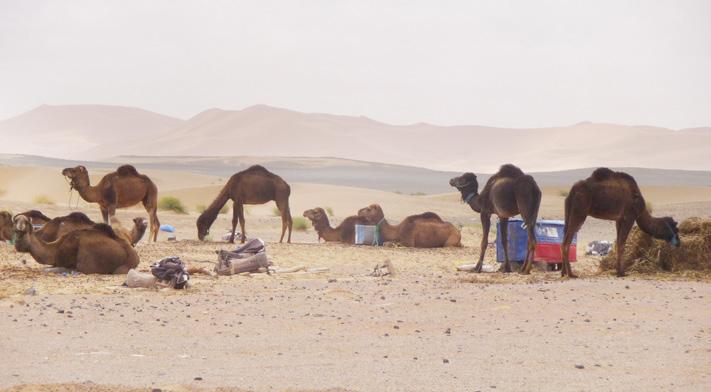
6 minute read
An Awe-full Journey
Fr John Scott
Unquestionably, the miracle [of the Crossing] would have been far more conspicuous and awful, but the width of the Sea now is greater than we can suppose the Israelites to have passed in a few hours, encumbered as they were, and it is utterly inconceivable that the Egyptians, with their chariots could ever have followed them into the coralline and weedy depths of a sea at least 12 miles wide, unless, indeed, miraculously enabled, as well as impelled, to do so.
Very early, in the cool of the morning, ere yet the paling stars had faded from the heavens, Achmet Nabout is stirring, a fire kindled, coffee made, the Arabs on the alert, the straggling camels called in, and while we refresh ourselves by a bath in the sea, the tents are struck and rolled up and our temporary settlement, so snug the night before, is taking to itself wings and leaving no trace but the marks of the boxes and other chattels, the impress of tent-poles and the ashes of our vanished hearth, which the next wind will efface. The sun is not yet up, though there is a glorious radiance through the vast opal concave of the sky, and it is for some time delightful to walk over the fine shining gravel surface of the silent desert, with the Arabs in straggling groups coming up slowly behind. What most surprised us was the elasticity of spirits we generally experienced in the Wilderness. The dry pure air probably had much to do with this. Sometimes the sense of free movement over the boundless expanse was indescribably and wildly ecstatic; in general the incidents of our little caravan seemed sufficient stimulus, and a universal cheerfulness prevailed amongst us in those hours of Dawn.
But when the sun rose higher and higher into the cloudless sky, and the blanched surface of the Desert glared under his fiery beams and the reflection from the glittering and heated waste dazzled the eye and seemed to pierce to the very brain, it was another matter. The camels now groan with distress, the Arabs are silent, slipping from time to time alongside the waterskins and with their mouths to the orifice, catching a few gulps without stopping; then burying their heads in the Ample Bernous, pace on again quietly hour after hour. The hot film, like the glow of a kiln, trembles over the glistening sands and plays the most fantastic tricks with the suffering traveller, cheating his vision with an illusory supply of water to quench his parching thirst. Half dozing, half dreaming as we advance, lulled into a vague reverie, the startling mirage, shifting with magic play, expands in gleaming blue lakes, whose cool borders are adorned with waving grooves, and on whose shining banks the mimic waves, with wonderful illusion, break in long glittering lines of transparent water – bright, fresh water – so different from the leathery decoction of our water skins. On our approach, the vision recedes, dissolves, combines again into new form all fancifully beautiful, then slowly fades and leaves but the burning horizon, upon which at wide intervals is seen perhaps a dim black speck appearing on the rolling sandy swell, like a ship far out at sea, the haze of the atmosphere gives it gigantic dimensions as it approaches, it proves as it nears us to be a caravan of Bedaween moving from one pasture ground to another. A few laconic words are exchanged between them and our people without stopping; in another hour, it is left far behind until again it disappears from vision. Thus pass the sultry and silent hours of noon.
There is a terrible and triumphant power of the sun upon this wide region of sterility and death, no trace of verdure is there but the stunted shrub which straggles at wide intervals about the sandy bed of some dried watercourse; no sign of living thing but the burrow of the rat, the slimy trail of the serpent or the carcass of the camel who makes his grave as well as his home in the wilderness, met with in every stage of decay. As the sun wheels round to the West and the shadows lengthen, all descend to walk enjoying the growing coolness and looking forward with delight for the signal to encamp. The Arabs, as the sun’s disc approaches the horizon, look for the best halting place, where the surface is hard and the tent pegs will easily hold, and where there is promise of a little scanty browsing for our animals. All is now activity, and throwing ourselves on a cushion of sand, we watch the rapid establishment of our temporary abode. Mats and carpets cover the ground within, mattresses and pillows are spread out, camp stools are arranged around, saddle bags fill up the background, the lantern is strung from the centre pole and there is a completeness and comfort, nay, luxury about your little home which is wanting in many a pompous hotel elsewhere.
Towards Sinai
Proceeding in this manner from day to day, we encamp at or pass by the different places which, in Biblical story, are associated with the march of the Israelites towards the promised land. We have passed the point of transition from the sandstone to the granite region and are now travelling through long, narrow, winding valleys without a sound or sign of living thing. But though in penetrating these solemn depths, one feels as if it were the first time their recesses had ever been explored, yet we soon perceived that others had been there before us and left memorials, although rude and hasty, of their brief pilgrimage. Wherever the smooth face of a rock offered a temptation, appeared some of those mysterious Sinaitic characters, which, till lately, had baffled the research of the learned and whose writers are even now unascertained.
It was here about that we found some remarkable hieroglyphics, and what, according to Dr Lepsius, is a portrait of King Cheops, the founder of the Great Pyramid. But when we asked our Arabs to halt at the entrance of this Wady, to our utter surprise, all the answer we received was ‘Maghana ma fish’ There is no Maghana! Not one of them had heard of such a place in the entire peninsula.
This was provoking enough to be in the vicinity of the most interesting object of the whole route and to miss it for the stupidity of one’s guides. Arriving at the mouth of a side valley which appeared to answer the position on the map, we came to a halt in the midst of a scene of loud uproar, the servants abusing the Arabs and our dragoman being with some difficulty prevented from beating our incapable Sheik who kept on reiterating with true Arab persistency ‘Maghana ma fish’.
While hesitating what course to adopt, a solitary Bedouin was descried passing down the valley. We hailed him and speedily found that here was an end to ‘Maghana ma fish’ – we were in the valley after all and he could conduct us to the place we wanted to see. Accordingly, taking Achmet Nabout and a leather water bottle, we started to clamber up the rocks, very difficult and inaccessible. At length we stood under the shadow of what appeared to be the mouth of a mine and the Arab, with sparkling eyes, pointed to the rocks and intimated it was there, and with a look intended to be submissive and fascinating, was just beginning to articulate ‘Backsheesh’ when with ugly misgiving and in loudest tones, we demanded the hieroglyphics. Vacantly he shook his head, but Achmet Nabout by a roundabout process explaining that we were looking for something chiselled in the rock, he suddenly remembered, tapped me on the shoulder and making me leap down with extreme difficulty into the mouth of the cave, pointed exultingly to some half dozen marks, evidently made by the miners, and at that moment felt no doubt the piastres glide into his leathern pouch.

But his wishes were not met in the way he expected for Achmet Nabout, seizing a fragment of rock which might have served one of Homer’s heroes, in uncontrollable fury, sent it thundering at his head; in dodging to avoid it, the poor fellow cut his foot and came hopping and limping and striving with an exhibition of his bleeding limb to turn the edge of our wrath. Turning away and advancing mechanically a few paces higher up the valley, the Arab still shaking his head at the eternal ‘ma fish’ still ringing in our ears when lo! perched up within a hundred yards of the very spot we had gained at the risk of our necks, yet concealed by some rocky protections, behold the large sculptured tablets with numerous figures, grinning down at us, as it were, like Elfish. We looked at them with a feeling which more than repaid us for the previous chagrin and toil.
It seemed wonderful, and almost incredible, to find here, in so distant a spot, high up on the side of a mountain, sculptured records of so remote an antiquity which, by the spirit of their style, testified to the high civilisation of Egypt at a period when the utmost limits of the historical recedes into the fabulous and mysterious of unrecorded time. Is it not too marvellous for belief that these tablets existed before the Exodus of the Israelites, when Moses, with all his host, actually passed beyond question down the Wady Mokatteb, or a short distance below on his way to Sinai?








